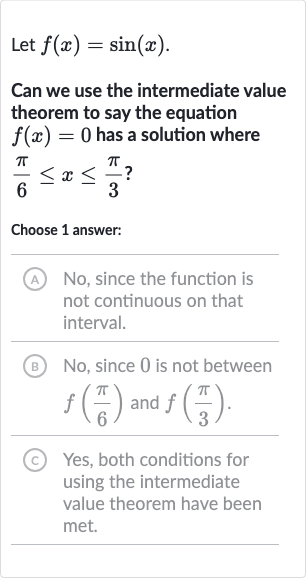AI tutor
Welcome to Bytelearn!
Let’s check out your problem:

Let .Can we use the intermediate value theorem to say the equation has a solution where ?Choose answer:(A) No, since the function is not continuous on that interval.(B) No, since is not between and .(C) Yes, both conditions for using the intermediate value theorem have been met.
Full solution
Q. Let .Can we use the intermediate value theorem to say the equation has a solution where ?Choose answer:(A) No, since the function is not continuous on that interval.(B) No, since is not between and .(C) Yes, both conditions for using the intermediate value theorem have been met.
- Check Continuity: First, we need to check if the function is continuous on the interval . The sine function is known to be continuous everywhere on the real number line.
- Evaluate Endpoints: Next, we evaluate the function at the endpoints of the interval. We need to find and to determine if is between these two values. Since is between and , we can say that is between and .
- Apply Intermediate Value Theorem: The intermediate value theorem states that if a function is continuous on a closed interval and is any number between and , then there exists at least one number in the interval such that . In our case, since is continuous on and is between and , there must be a value in such that .
More problems from Write a quadratic function from its x-intercepts and another point
QuestionGet tutor help
QuestionGet tutor help
QuestionGet tutor help
QuestionGet tutor help
QuestionGet tutor help
QuestionGet tutor help
QuestionGet tutor help
QuestionGet tutor help
